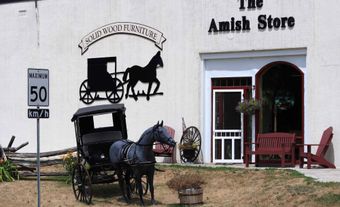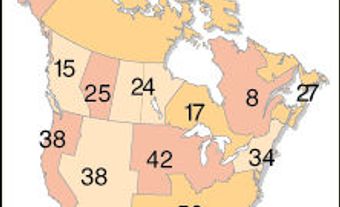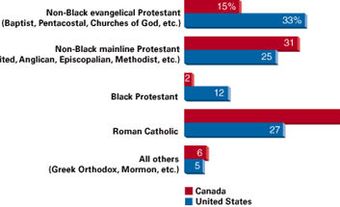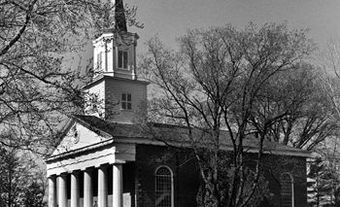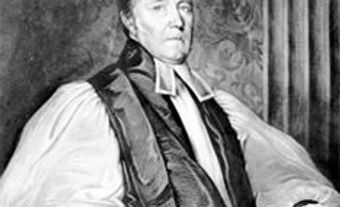The term "Baptist" is derived from the name given to Christians who were baptized after they made a profession of faith, rather than baptized as infants. Baptists are distinct from other Christians who practice "paedo" or "infant" baptism. In the 2011 National Household Survey (NHS), 635,840 Canadians identified as Baptist.

Boys crossing railroad tracks towards Seaview African United Baptist Church, Africville, circa 1965.
Background
It is generally believed that the first Baptists expressed this form of baptism during the 16th century, although Baptist theologians argue that the New Testament writings and era demonstrated this mode of baptism. While these Christians were originally called Anabaptists ( meaning “rebaptized”) several traditions emerged within Europe and England. Christian churches with this view of baptism such as the Mennonites became known as Anabaptists, while those emerging in England became known as Baptists; both terms apply to Canadian Christians who practice baptism following a profession of faith.
It is difficult to estimate the number of Baptists and Baptist churches in Canada. This is because many have made changes to enhance their ministry by altering their name without significant theological changes. Changing the name "Baptist Church" to "Community Church" or with the substitution of "Grace" or "Fellowship" has been a response to the desire to belong to a community within society, and against some negative stereotypes that Baptists are old-fashioned and their churches irrelevant. The changes in name have therefore made it more difficult to identify Baptist communities or churches that hold to Baptist principles and has in some cases caused anxiety and concern that Baptist heritage is being lost. For others, a changing identity represents a contemporary response that has allowed Baptists to maintain rich and healthy links with society.
Did you know?
Baptist membership does not include children or adherents. These groups actively participate in church life but are not normally counted as members until they have joined the church after public profession of faith and baptism.
As in other Protestant denominations, membership has declined as a proportion of the total Canadian population; for example, in 1921 4.8 per cent of the population was Baptist, compared to 2.4 per cent in 1991. In the 2001 census on religion, just under 730,000 Canadians (representing 2.5 per cent of the population) identified themselves as Baptists, with 68 per cent over age 25; of those, 40.5 per cent were either retired or approaching retirement (approximately 55 years or older). In the 2011 National Household Survey (NHS), 635,840 Canadians identified as Baptist.
Basic Beliefs
Baptists, like Christians of many other evangelical expressions, value the importance of the Bible as the rule of faith. Baptists believe in the importance of the freedom to interpret the Bible, and that the Holy Spirit is present within every believer to aid and form an understanding of the message of the Bible. Individuals worship as a group of "called out people" as members of the church. Membership is by profession of faith alone, recognized by baptism as symbolic of a transformation and a new life. Historically, since the 1640s, entrance into the church required believer's baptism, but in recent times there has been a move toward open membership which does not require members to undergo this baptismal ordinance.
In addition to baptism, the other sacrament or ordinance is communion (Lord's Supper), in which all people attending the service are invited to take part. In Baptist churches this ordinance is not restricted but members attending the service are encouraged to adopt a new heart and confess their weaknesses before taking part in communion.
Baptist theology is orthodox and progressive. Apart from the distinctive baptismal ordinance and theological aspects of church, Baptists believe in the historical Christian doctrines reaffirmed at the time of the Reformation: the trinity, the virgin birth, the literal resurrection of Jesus Christ and his return at the end of the age.
Leadership and Organization
Ministry is conceived as a service to which all disciples are called in order to make use of their gifts (the priesthood of all believers). The pastor's task is seen as a full-time calling to preach, teach, counsel, train and co-ordinate the ministries exercised by all members. Ordination, to which in many Baptist churches both women and men are admitted, is not a sacrament; it provides for public recognition of the call, gifts and training for ministry. Deacons are lay men and women elected from the local congregation to assist with pastoral care, communion celebration and general administration.
Baptists are divided over the issue of ordination of women, with many congregations holding to a more traditional position or in some cases restricting the office of "senior pastor" to men. Leadership has become an increasingly important aspect within Baptist churches and this has been recognized recently by a historic appointment at Acadia Divinity College in the field of Leadership.
The belief in the congregational nature of the local church is a central tenet. Local churches also have autonomy in decisions, statements of belief, calling of ministers and all other matters involved in the church. Central to the Baptist belief is the understanding that the church is built upon the called out people rather than on any historic building or denomination. As a result of the decentralized nature of the church and its government, Baptists in Canada have largely remained separated into regional fraternals, federations, assemblies and conventions. This modern structure results from the earliest non-conformist principles of religious freedom and a distinction between the state and church. Despite this distinction, Baptists continue to influence the political, economic and cultural attributes where they have significant church numbers.
While Baptists are independent they do belong to the broader community. The major groupings of Baptists are the Association of Regular Baptist Churches, the Baptist General Conference of Canada, Canadian Baptist Ministries, the Canadian National Baptist Convention, and the Fellowship of Evangelical Baptist Churches in Canada.
Baptists in Atlantic Provinces
The first English-speaking Baptist church was founded 1609 in Amsterdam, the Netherlands, by Puritan refugees from England. The oldest congregation in England was organized in 1612 near London, and the first in America at Providence, Rhode Island, in 1639. The original Baptist churches in Canada were formed under ministers from Massachusetts, at Sackville, Nova Scotia (now in New Brunswick), in 1763, and at Horton (now Wolfville), NS, in 1765 or 1766. Both congregations ceased to exist in the mid-1770s, although the church in Wolfville, recovenanted in 1778, is the oldest continuing Baptist church in Canada. The Great Awakening in Nova Scotia, and revivals in the 19th century, led to rapid growth in the Maritimes. In New Brunswick Baptists became the largest Protestant denomination.
Originally, the majority adhered to the Regular (Calvinist) theological orientation while a minority endorsed the opposing Free Will (Arminian) position, maintaining the possibility of salvation for all. The 2 groups merged in 1906 to form the United Baptist Convention of the Maritime Provinces.
In 1963 "Maritime" was changed to "Atlantic" (UBCAP) to include Newfoundland, where Baptist churches were introduced in the 1950s; the association later changed its name to Convention of Atlantic Baptist Churches (2001). Only in the Atlantic provinces have Canadian Baptists avoided organizational schism.
Did you know?
Churches organized in the African United Baptist Association (part of the Convention of Atlantic Baptist Churches) have been important in the historic black community in Nova Scotia (see Africville).

The Seaview African United Baptist Church was established at Africville, Nova Scotia in 1849. Demolished in 1969, it was rebuilt in the summer of 2011.
Ontario and Quebec
In Upper and Lower Canada Baptist life was shaped from the beginning by conflicting convictions and traditions among immigrants from the US and Britain. The first churches were planted by American ministers (Caldwell's Manor in the Eastern Townships, Lower Canada, in 1794, and a church near Beamsville, Upper Canada, in 1796). English immigrants to Upper and Lower Canada gave rise to open communion in churches established by American ministers in the late 1700's who refused to allow Baptists to take communion.
From 1815 on, immigrants from the Scottish Highlands brought the revivalist tradition of James and Robert Haldane to the Ottawa Valley. Controversy over communion practice and other disagreements hindered co-operation in missionary work and education for several decades. In 1888, two regional bodies united in the Baptist Convention of Ontario and Quebec (BCOQ).
From the 1830s on, slaves escaping from the southern US by the Underground Railroad established a network of black congregations. In the 1830s, French-speaking immigrants from Switzerland arrived in Quebec (see Swiss Canadians), and under Henriette Feller (1800-68) initiated Baptist work in Montreal and the Eastern Townships (the Grande Ligne Mission). In 1969 the French churches organized their own Union d'églises baptistes françaises au Canada (UEBFC).
Western Provinces
In 1873 Ontario Baptists sent a minister to Winnipeg. The First Baptist Church was established there in 1875, and in 1884 the Baptist Convention of Manitoba and the North-West was organized. Meanwhile, churches were founded on the Pacific coast, in Victoria (1876) and New Westminster (1878). The Convention of Baptist Churches in BC was formed in 1897. Ten years later the churches in the western provinces formed the Baptist Convention of Western Canada, renamed the Baptist Union of Western Canada in 1909 and the Canadian Baptists of Western Canada in 2007. With the growth in church membership in central and western Canada since the 1900s, Baptist congregations, composed of immigrants, worship in more than 30 different languages.
Other Baptist Groups
In 1944 a national fellowship was formed called the Baptist Federation of Canada, which became the Canadian Baptist Federation in 1983. The main Canadian national body is the Canadian Baptist Ministries (CBM). Canadian Baptist Ministries, or Ministères Baptistes Canadiens, is an association of four regional Baptist conventions in Canada - the Baptist Convention of Ontario and Quebec (BCOQ), the Canadian Baptists of Western Canada (formerly the Baptist Union of Western Canada), the Convention of Atlantic Baptist Churches and l'Union d'Églises Baptistes Françaises au Canada. It was formed in 1995 by the merger of Canadian Baptist International Ministries (CBIM) and the Canadian Baptist Federation (CBF).
Although their roots are in the Canadian Protestant tradition, several smaller groups maintain a relationship with Baptist groups in the US even though they have Canadian administrations. The North American Baptist Conference is a fellowship of originally German-speaking churches. The oldest such congregation was organized in Bridgeport, Ontario (near Kitchener-Waterloo) in 1851 but most of the churches today are located in the western provinces and have long since lost ethnic identity.
Swedish immigrants founded Baptist churches in Waterville, Quebec, Winnipeg and elsewhere in the 1890s (see Swedish Canadians). Their descendants continue a separate fellowship known as the Baptist General Conference of Canada. The majority of their congregations today are in western Canada.
Against the protests of the older indigenous Canadian Baptist bodies, the largest Protestant denomination in the US, the Southern Baptists, expanded work into western and central Canada from the 1950s on. In 1985 the congregations, which were initially associated with the American body, formed the Canadian Convention of Southern Baptists (renamed the Canadian National Baptist Convention in 2008), with affiliated churches originally in all except the Atlantic provinces, and subsequently from coast to coast. A few Bible Baptist Churches and Seventh-Day Baptist Churches relate to the corresponding bodies in the US.
The Canadian Baptist mosaic has been further enriched by several small groups with distinctive identities. For example, the Alliance of Reformed Baptist Churches, founded 1888 in New Brunswick as part of the holiness movement, merged with the Wesleyan Methodist Church in 1966. In 1968 the new body joined the Pilgrim Holiness Church to become the Wesleyan Church.
The Primitive Baptist Conference of New Brunswick traces its origin (about 1875) to the leadership of George W. Orser. In the early 1980s this conference established links with the National Association of Free-Will Baptists in the US. The Association of Regular Baptist Churches (Canada), organized in 1957, comprises a small cluster of churches led by Toronto's Jarvis Street Baptist Church. There are also many independent Baptist congregations which are not affiliated with any larger group.
Contributions in Canada
Many Baptists have made significant contributions to the Baptist community in Canada. These leaders and scholars include Dr Jonathan Wilson, professor of theology at Carey Theological College, who added considerably to the theological thought and discussion of Canadian religion and social justice. Dr Gary Nelson, former general secretary of Canadian Baptist Ministries, contributed to the global influence that Baptists have exercised in missionary work and overseas partnerships. In the field of Biblical scholarship Dr Craig A. Evans, Acadia Divinity College, has become internationally known for his critique of populist interpretations of Biblical literature. Dr Brian D. MacArthur, president of Crandall University in New Brunswick, has developed the leadership of Atlantic Canada's only Christian university, and McMaster Divinity College has established a PhD programme under the direction of its president, Dr Stanley E. Porter.
Co-operation with Other Christians
Several conventions or conferences co-operate in the Baptist World Alliance. Baptists have been divided in their attitudes to ecumenical relations. Many congregations co-operate with other churches in Evangelism, joint services and social ministries, and many support the Evangelical Fellowship of Canada. The Canadian Baptists of Western Canada and the Baptist General Conference are member bodies of the EFC. The CBF was a member of the Canadian Council of Churches from its founding in 1944. In 1980, however, it terminated its affiliation because of lack of consensus among its four constituent conventions. Only the BCOQ remains in the CCC. No Canadian Baptist body joined the World Council of Churches.
Higher Education and Politics
Between the 1820s and 1860s Baptists became aware that as a group there was discrimination against the free churches. Baptists in Ontario gave leadership in the Clergy Reserves dispute and as a result were instrumental in establishing a non-sectarian university in Toronto. At the same time in Nova Scotia, Baptists formed the first post-secondary educational institution in Canada, Acadia College (1838), that did not require a statement of belief or denominational affirmation from either students or teachers.
Baptists founded several colleges: Acadia College (1838), later called Acadia University; the Canada Baptist College at Montreal (1838-49); Woodstock College, Woodstock, Ontario (1857) and Toronto Baptist College (1881), both to be replaced by McMaster University; and Brandon College (1899-1938), now Brandon University. All have passed from Baptist control. However, the different Baptist conventions and conferences today operate two colleges, 11 seminaries and several Bible schools and centres for lay training. The nature of Baptist theological education is changing, however, as increasing numbers of churches are calling ministers without formal seminary training.
Among the many Baptist educators and scholars two deserve special mention: George P. Gilmour, president of McMaster University (1950-61), and Watson Kirkconnell, president of Acadia University (1948-64). In politics, several leaders enjoyed close association with the Baptist fellowship: Prime Ministers Alexander Mackenzie, Charles Tupper and John Diefenbaker; and premiers William Aberhart, Ernest Manning and Thomas ("Tommy") Douglas.
Contemporary Developments
The Internet and social networking have changed the perception of the Baptist church among young people and many churches progressively use technology as part of their ministry. There is a growing trend toward offering online church services and podcasts, known as "Godcasts." Additionally, Baptist radio stations continue to reach out to their regions in the same evangelical manner as early Baptists did on horseback.
The issue of theological understanding has influenced many Baptist churches and created a descriptive language to identify the name of the place of worship rather than describing an individual or community as being "Baptist." Denominationalism such as being Baptistic is giving way to the Christian church defining itself in theological terms that are a broader identification based on a believer's baptism.

 Share on Facebook
Share on Facebook Share on X
Share on X Share by Email
Share by Email Share on Google Classroom
Share on Google Classroom
